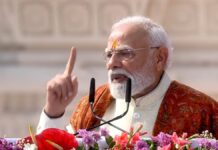New Delhi: As Delhi gears up for the upcoming state elections on February 5, political parties are focusing their attention on one of the most crucial voter segments—slum-dwellers. With 675 slum clusters housing over 15.5 lakh people, who represent roughly 10 percent of the electorate, this demographic is key to determining the outcome of the fierce three-way battle for the Chief Minister’s chair in the national capital.
The Aam Aadmi Party (AAP), Bharatiya Janata Party (BJP), and Congress have all identified slum areas as essential battlegrounds in the upcoming elections. AAP aims to retain its base among slum-dwellers, a key constituency that has supported the party for years. In contrast, the BJP is hoping to break into this traditionally non-BJP stronghold by making promises of better housing and welfare schemes. The Congress, which has seen its support base erode over the past decade, is trying to win back the trust of slum residents by engaging in direct outreach through door-to-door surveys and community interactions.
Prime Minister Narendra Modi recently launched a key initiative by inaugurating 1,667 new flats for slum residents at Jhuggi Jhopri (JJ) clusters, signaling the BJP’s serious commitment to improving conditions in these areas. Union Home Minister Amit Shah also addressed the ‘Jhuggi Basti Pradhan Sammelan,’ where he promised that every slum-dweller would be provided a home if the BJP wins the election. The BJP has taken to criticising Delhi CM Arvind Kejriwal’s lifestyle, accusing him of corruption while slum residents continue to face poor conditions under AAP’s governance.
In response, AAP has been vocal in its criticism of the BJP, accusing them of demolishing slums in Tughlakabad, Okhla, Sundar Nagari, and other areas ahead of the G-20 Summit in 2023. AAP chief Arvind Kejriwal has further claimed that the BJP intends to acquire land after the elections by demolishing slums. Kejriwal challenged Amit Shah to sign an affidavit guaranteeing housing for slum-dwellers and withdrawing related cases, vowing not to contest the upcoming elections if Shah agrees.
Meanwhile, the Congress party, led by Rahul Gandhi, is focusing on regaining ground among slum-dwellers. Rahul Gandhi’s upcoming “Jai Bapu, Jai Bhim, Jai Samvidhan” rally in Zero Pushta, Seelampur, a slum-dominated locality, is set to be a cornerstone of the party’s campaign. Congress is also leveraging the support of influential Dalit leader Veer Singh Dhingan and former AAP MLA Rajendra Pal Gautam to strengthen its position.
The political parties are also competing on welfare promises. AAP continues its welfare-focused approach with promises such as 200 units of free electricity, 20,000 liters of free water per month, and Rs 2,100 per month for eligible women under MMMSY. BJP, in turn, has pledged to enhance these offerings, promising to increase free electricity to 300 units and raise the women’s allowance to Rs 2,500 per month.
Congress is introducing its own set of promises, including Rs 2,500 to women, Rs 8,500 for educated unemployed youth for one year, and health insurance coverage of Rs 25 lakh under the ‘Jeevan Raksha Yojana.’
As all three parties vie for the support of the slum-dwelling electorate, their approaches to welfare, housing, and governance will be put to the test when the results are counted on February 8. Will the BJP and Congress succeed in reclaiming power, or will AAP secure its third consecutive term? Only time will tell.








Technology us Very well presented. Every quote was awesome and thanks for sharing the content. Keep sharing and keep motivating others.
I’m extremely impressed together with your writing abilities as smartly as with the format for your blog. Is this a paid subject or did you modify it yourself? Anyway keep up the nice quality writing, it’s rare to peer a nice blog like this one nowadays!
Well, we really like this blog, and we will continue to visit this website often, greetings from us RAMATOGEL
采用高效谷歌站群策略,快速提升网站在搜索引擎中的可见性与权重。谷歌站群
Khám phá thế giới giải trí trực tuyến đỉnh cao tại MM88, nơi mang đến những trải nghiệm cá cược thể thao và casino sống động.
搭载智能站群程序,自动化搭建与管理,为SEO项目提供核心驱动力。站群程序
kuwin sở hữu kho game đa dạng từ slot đến trò chơi bài đổi thưởng, mang đến cho bạn những giây phút giải trí tuyệt vời.
Với giao diện mượt mà và ưu đãi hấp dẫn, MM88 là lựa chọn lý tưởng cho các tín đồ giải trí trực tuyến.